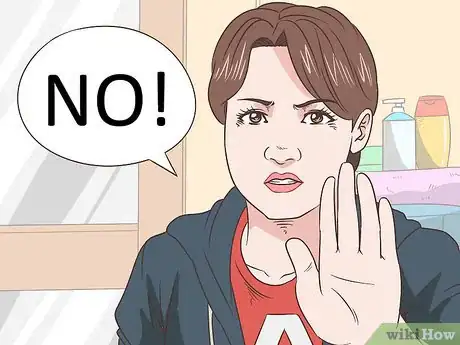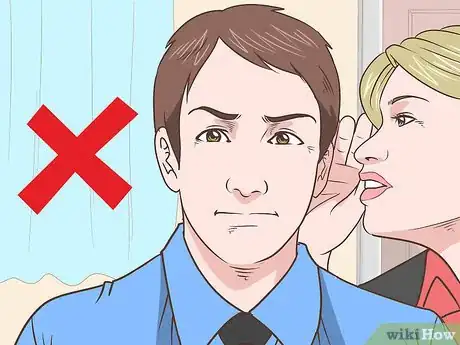This article was co-authored by Amy Wong. Amy Eliza Wong is a Leadership and Transformational Coach and the Founder of Always on Purpose, a private practice for individuals and executives looking for help in increasing personal well-being and success and in transforming work cultures, developing leaders, and improving retention. With over 20 years of experience, Amy coaches one-on-one and conducts workshops and keynotes for businesses, medical practices, non-profits, and universities. Based in the San Francisco Bay Area, Amy is a regular instructor at Stanford Continuing Studies, holds an MA in Transpersonal Psychology from Sofia University, a certification in Transformational Life Coaching from Sofia University, and a certification in Conversational Intelligence from CreatingWE Institute.
There are 10 references cited in this article, which can be found at the bottom of the page.
This article has been viewed 60,109 times.
Quiet and confidence aren’t typically associated with one another. When you think of the word ‘confident,’ you might imagine someone who is outgoing, the center of attention. But, you don’t have to talk constantly to prove your confidence. You can convey even greater self-assurance by displaying the right body language, practicing assertiveness, and being humble in your interactions.
Steps
Displaying Confident Body Language
-
1Keep your chin up and shoulders back. Nervous or insecure people often walk around with their chins pointed down and their eyes trained on the floor. Show confidence by lifting your chin as if there was an invisible thread pulling your head up.
- Keeping your chin level helps with posture as a whole. Sometimes, when you are uncertain you might slouch or cower. Thinking about an invisible thread going from the crown of your head down through your spine can help you pull your shoulders back, too.[1]
-
2Plant your feet hip-width apart. If you’re standing, balance your weight evenly between your legs. Stand up straight with your feet hip-width apart. Avoid tapping your feet or turning your body away from those you are speaking to. You can relax your arms at your sides, or do a “power pose” by placing them on your hips.[2]Advertisement
-
3Sit relaxed in your seat. If you’re seated, show confidence sitting with a relaxed posture. Lean back slightly in your chair while still turning towards the other person(s). You might even “power pose” by clasping your hands behind your head in a “V” shape. [3]
- Another option is to simply place your hands in your lap if you’re not seated behind a table. If you are, place them lightly on the table in front of you. Don’t cross your arms.
-
4Make eye contact. When you greet others or are making conversation, don’t avoid their eyes. Anxious or unsure people may feel intimidated by eye contact, but a quietly confident person knows that strong eye contact helps you come off as secure and in control.
- This doesn’t mean staring someone down. You can casually look off at times. But, try to maintain eye contact, particularly during one-on-one conversations.
- If making direct eye contact feels weird for you, try glancing at the person’s nose for a few seconds, then their mouth, then their entire face. They won’t be able to tell that you’re not looking at their eyes.[4]
-
5Pause and breathe deeply. When you are feeling short on confidence, it's easy to get all wound up. If this starts to happen, just take a brief moment to breathe deeply and collect yourself.
- Inhale deeply from your nose for a count of four. Then, hold the breath for a few counts. Exhale from your mouth for a count of eight. Repeat the cycle until you start to feel calm again.
Practicing Assertiveness
-
1Know your value. Self-centered people may display their confidence by dominating conversations and bragging about their talents. Deep down, they do this because they are seeking validation. A quietly confident person understands what they bring to the table. Therefore, you won’t need to openly seek the validation of others through your external accomplishments. Those that have the least to prove are usually the most confident.[5]
- Believe in your self-worth. If you have trouble with this, it can help to make an ongoing list of some of the major challenges you have overcome and the milestones you have passed. Reflect on the list often to remind yourself of your value.
-
2Express your needs. When you know your value, you have no problem letting others know what you need from them.[6] Passive people may expect people to read their minds, or guess at their needs. Quiet confidence means having the self-assurance to meet people halfway and communicate your needs to them.[7]
- Tell people what you need in a respectful, clear, and honest manner. For instance, you might tell a friend, “I am worried I might lose my job, so I really need to cut back on extra spending” rather than snapping at her because she wants to go shopping.
-
3Say “no.” Passive-aggressive people may say “yes” to requests and then resent the person for asking. A quietly confident person is okay with saying “no” when a request doesn’t serve them. Start small and practice saying “no” with the people in your life.[8]
- For example, your coworker tries to shove his extra work off on you for the second week in a row. You might say, “No, Patrick. I can’t take your work. I was happy to help last week, but I don’t have the time to do your work and mine.”
-
4Accept compliments instead of denying them. Many self-conscious people don’t know how to respond to compliments or feel uncomfortable or awkward when they’re given. Show assertiveness by accepting them kindly and fully. This is a technique known as “positive inquiry.”
- For example, if someone says, “This meal you made is delicious!” try saying “Thanks! I’m glad you like it. I’m enjoying it too,” instead of saying, “It’s an easy recipe,” or “It’s alright.”[9]
-
5Repeatedly say what you want to show calm persistence. This is called “the stuck record technique,” and can be used in heated arguments to keep the conversation on track. Clearly, calmly state what you want, and say it again and again calmly without giving up to display assertiveness.[10]
- For example, if your new shoe broke and you went back to the store to return the pair, you might say, “I bought these shoes last week and the strap broke yesterday. I’d like a refund, please.” Then, if the store’s employee says something like, “These have obviously been worn a lot. You can’t expect me to give you your money back,” stay calm and say, “The strap has broken after only one week. I’d like a refund.”
Interacting with Others
-
1Listen actively. Being loud, flashy, and talking all the time, sends a “look at me” message. However, quietly confident people realize that you gain much more respect (and learn more, too) by listening more than you talk.
- Try to truly understand the other person’s message. Don’t interrupt them. Once they’re finished, try to paraphrase what they said to make sure you properly understood.
-
2Praise others rather than yourself. Some people act as if it’s physically painful to highlight others’ successes. In truth, when you are able to celebrate others, it shows that you can share the spotlight, and that you are a team player. Make an effort to call out someone else for an accomplishment when the situation arises.[11]
-
3Own up to your mistakes. An insecure person might hope the ground swallows them after a mistake. They may simply search for an out. Meanwhile, an arrogant person may find a way to hand the blame off onto someone else. Confident people do not make excuses when they made a mistake. They accept it, correct it, learn from it, and move on. It can be hard to admit “I was wrong.” But doing so shows others that you are willing to take responsibility for your actions. [12]
- As soon as you realize you made an error, take ownership. For example, the client is late for the meeting because you forgot to schedule their car service. Say, “Oh, goodness. This is my fault. I forgot to call a car. I’ll fix this right away.”
-
4Accept advice and mentorship from others. Quietly confident people are genuine, honest with themselves, and honest with others. They aren’t afraid to admit that they don’t have all the answers. Everyone has areas in which they can improve. Don’t be shy about owning up to yours and asking for help.
- Be sure to admit it if you do not know something and to let others know that you will try to find the answer.
- You might say, “I must have forgotten that aspect of our training. Do you mind offering me a refresher course?” Or, “Helen, you really have a handle on presentations. Can you give me some pointers?”
-
5Stop gossiping. One way to appear low in confidence is by constantly gossiping about others. A quietly confident person knows their own value, so they don’t get off by putting others down. Stop hanging with people who gossip. Learn how to redirect conversations when they're headed for gossip town.[13]
- For example, you might say, “Enough about that, what did you guys do this past weekend” to change a conversation when gossiping is taking place.
Expert Q&A
Did you know you can get expert answers for this article?
Unlock expert answers by supporting wikiHow
-
QuestionHow can I have quiet confidence?
 Amy WongAmy Eliza Wong is a Leadership and Transformational Coach and the Founder of Always on Purpose, a private practice for individuals and executives looking for help in increasing personal well-being and success and in transforming work cultures, developing leaders, and improving retention. With over 20 years of experience, Amy coaches one-on-one and conducts workshops and keynotes for businesses, medical practices, non-profits, and universities. Based in the San Francisco Bay Area, Amy is a regular instructor at Stanford Continuing Studies, holds an MA in Transpersonal Psychology from Sofia University, a certification in Transformational Life Coaching from Sofia University, and a certification in Conversational Intelligence from CreatingWE Institute.
Amy WongAmy Eliza Wong is a Leadership and Transformational Coach and the Founder of Always on Purpose, a private practice for individuals and executives looking for help in increasing personal well-being and success and in transforming work cultures, developing leaders, and improving retention. With over 20 years of experience, Amy coaches one-on-one and conducts workshops and keynotes for businesses, medical practices, non-profits, and universities. Based in the San Francisco Bay Area, Amy is a regular instructor at Stanford Continuing Studies, holds an MA in Transpersonal Psychology from Sofia University, a certification in Transformational Life Coaching from Sofia University, and a certification in Conversational Intelligence from CreatingWE Institute.
Leadership & Transformational Coach
References
- ↑ http://www.businessinsider.com/body-language-tricks-appear-more-confident-2016-3/#-6
- ↑ https://www.ted.com/talks/amy_cuddy_your_body_language_shapes_who_you_are
- ↑ http://changingminds.org/techniques/body/confident_body.htm
- ↑ http://www.businessinsider.com/body-language-tricks-appear-more-confident-2016-3/#-6
- ↑ http://www.lifecoach-directory.org.uk/lifecoach-articles/8-signs-youre-quietly-confident
- ↑ Amy Wong. Leadership & Transformational Coach. Expert Interview. 30 April 2020.
- ↑ https://psychcentral.com/lib/5-tips-to-increase-your-assertiveness/?all=1
- ↑ http://www.mayoclinic.org/healthy-lifestyle/stress-management/in-depth/assertive/art-20044644?pg=2
- ↑ https://www.skillsyouneed.com/ps/assertiveness-techniques.html
- ↑ https://www.skillsyouneed.com/ps/assertiveness-techniques.html
- ↑ http://www.huffingtonpost.com/adam-gilad/5-subtle-traits-of-quiet-confidence_b_9413218.html
- ↑ http://www.lifecoach-directory.org.uk/lifecoach-articles/8-signs-youre-quietly-confident
- ↑ https://tinybuddha.com/blog/how-to-stop-gossiping-and-creating-drama/
About This Article
To be quietly confident, do your best to stand up straight, hold your chin up high, and make eye contact with people, which will make you appear more confident without having to say anything. Additionally, don't feel like you have to dominate conversations or brag about your talents, which is usually what people do when they're insecure and looking for validation. Instead, be a good listener, and praise other people to show that you're confident enough to not be threatened by them. You can also quietly project confidence by staying calm in stressful or frustrating situations, which will show people that you're in control of your emotions. For advice from our expert co-author, like how to be quietly assertive, keep reading!








































































